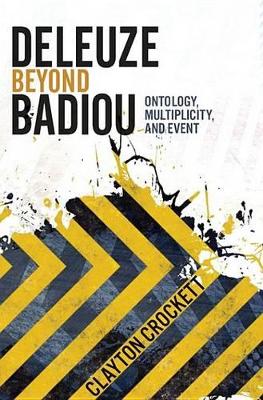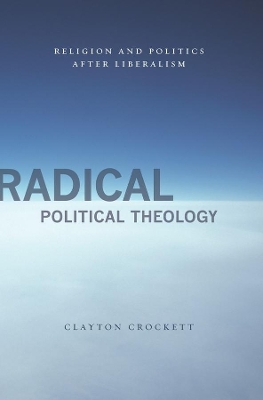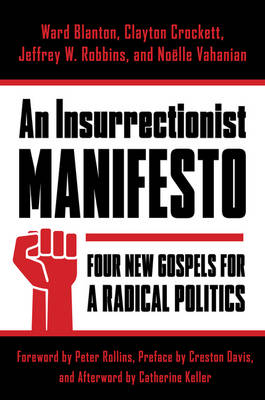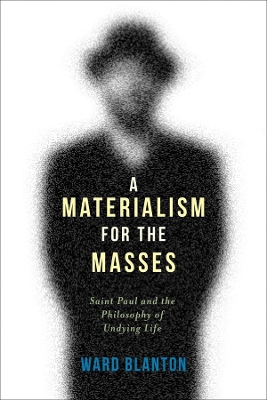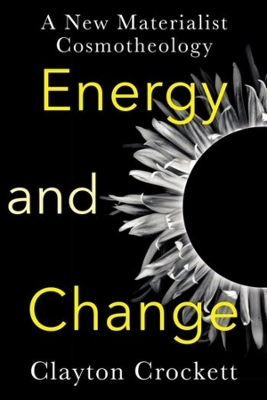Insurrections: Critical Studies in Religion, Politics, and Culture
5 total works
First published in 1997, Alain Badiou’s Deleuze: The Clamor of Being cast the thinker as a secret philosopher of the One, compromising Deleuze’s standing among political philosophers concerned with the practical and historical aspects of existence. Clayton Crockett rehabilitates Deleuze’s position within contemporary, cutting-edge political and philosophical thought, advancing an original reading of the thinker’s major works and a constructive conception of his philosophical ontology.
Through close readings of Deleuze’s Difference and Repetition, Capitalism and Schizophrenia (with Felix Guattari), and Cinema 2, Crockett argues Deleuze is anything but the austere, quietistic, and aristocratic intellectual Badiou portrays. Instead, Crockett underscores Deleuze’s radical aesthetics and innovative scientific, political, and mathematical forms of thought. Challenging predominant orthodoxy, he also refutes the notion that Deleuze retreated from politics toward the end of his life, grounding his argument in the revolutionary political concept of the time-image developed in Cinema 2. Using Badiou’s critique as a foil, Crockett maintains the profound continuity of Deleuze’s work and builds a general interpretation of his more obscure formulations. His study also offers original readings of Badiou’s central philosophical texts, Theory of the Subject, Being and Event, and Logics of Worlds, and uses the devastating earthquake in Haiti as a test case for applying Deleuze’s thought.
Through close readings of Deleuze’s Difference and Repetition, Capitalism and Schizophrenia (with Felix Guattari), and Cinema 2, Crockett argues Deleuze is anything but the austere, quietistic, and aristocratic intellectual Badiou portrays. Instead, Crockett underscores Deleuze’s radical aesthetics and innovative scientific, political, and mathematical forms of thought. Challenging predominant orthodoxy, he also refutes the notion that Deleuze retreated from politics toward the end of his life, grounding his argument in the revolutionary political concept of the time-image developed in Cinema 2. Using Badiou’s critique as a foil, Crockett maintains the profound continuity of Deleuze’s work and builds a general interpretation of his more obscure formulations. His study also offers original readings of Badiou’s central philosophical texts, Theory of the Subject, Being and Event, and Logics of Worlds, and uses the devastating earthquake in Haiti as a test case for applying Deleuze’s thought.
In the 1960s, the strict opposition between the religious and the secular began to break down, blurring the distinction between political philosophy and political theology. This collapse contributed to the decline of modern liberalism, which supported a neutral, value-free space for capitalism. It also deeply unsettled political, religious, and philosophical realms, forced to confront the conceptual stakes of a return to religion. Gamely intervening in a contest that defies simple resolutions, Clayton Crockett conceives of the postmodern convergence of the secular and the religious as a basis for emancipatory political thought. Engaging themes of sovereignty, democracy, potentiality, law, and event from a religious and political point of view, Crockett articulates a theological vision that responds to our contemporary world and its theo-political realities. Specifically, he claims we should think about God and the state in terms of potentiality rather than sovereign power. Deploying new concepts, such as Slavoj Zizek's idea of parallax and Catherine Malabou's notion of plasticity, his argument engages with debates over the nature and status of religion, ideology, and messianism.
Tangling with the work of Derrida, Deleuze, Spinoza, Antonio Negri, Giorgio Agamben, Alain Badiou, John D. Caputo, and Catherine Keller, Crockett concludes with a reconsideration of democracy as a form of political thought and religious practice, underscoring its ties to modern liberal capitalism while also envisioning a more authentic democracy unconstrained by those ties.
Tangling with the work of Derrida, Deleuze, Spinoza, Antonio Negri, Giorgio Agamben, Alain Badiou, John D. Caputo, and Catherine Keller, Crockett concludes with a reconsideration of democracy as a form of political thought and religious practice, underscoring its ties to modern liberal capitalism while also envisioning a more authentic democracy unconstrained by those ties.
An Insurrectionist Manifesto
by Ward Blanton, Clayton Crockett, Jeffrey W. Robbins, and Noelle Vahanian
Published 12 April 2016
An Insurrectionist Manifesto contains four insurrectionary gospels based on Martin Heidegger's philosophical model of the fourfold: earth and sky, gods and mortals. Challenging religious dogma and dominant philosophical theories, they offer a cooperative, world-affirming political theology that promotes new life through not resurrection but insurrection. The insurrection in these gospels unfolds as a series of miraculous yet worldly practices of vital affirmation. Since these routines do not rely on fantasies of escape, they engender intimate transformations of the self along the very coordinates from which they emerge. Enacting a comparative and contagious postsecular sensibility, these gospels draw on the work of Slavoj Zizek, Giorgio Agamben, Catherine Malabou, Francois Laruelle, Peter Sloterdijk, and Gilles Deleuze yet rejuvenate scholarship in continental philosophy, critical race theory, the new materialisms, speculative realism, and nonphilosophy. They think beyond the sovereign force of the one to initiate a radical politics "after" God.
Nietzsche and Freud saw Christianity as metaphysical escapism, with Nietzsche calling the religion a "Platonism for the masses" and faulting Paul the apostle for negating more immanent, material modes of thought and political solidarity. Integrating this debate with the philosophies of difference espoused by Gilles Deleuze, Michel Foucault, Jacques Derrida, Jacques Lacan, and Pier Paolo Pasolini, Ward Blanton argues that genealogical interventions into the political economies of Western cultural memory do not go far enough in relation to the imagined founder of Christianity. Blanton challenges the idea of Paulinism as a pop Platonic worldview or form of social control. He unearths in Pauline legacies otherwise repressed resources for new materialist spiritualities and new forms of radical political solidarity, liberating "religion" from inherited interpretive assumptions so philosophical thought can manifest in risky, radical freedom.
As humanity continues to consume planetary resources at an unsustainable rate, we require not only new and renewable forms of energy but also new ways of understanding energy itself. Clayton Crockett offers an innovative philosophy of energy that cuts across a number of leading-edge disciplines. Drawing from contemporary philosophies of New Materialism, non-Western traditions, and the sciences, he develops a comprehensive vision of energy as a material process spanning physics, biology, politics, ecology, and religion.
Crockett argues that change is foundational to material reality, which is ceaselessly self-organizing. We can observe energy’s effects in the operations of natural selection as well as those at work in human societies. Matter and energy are not an oppositional binary; rather, they are expressions of how change functions in the universe. Ultimately, Crockett argues, we can conceive of God neither as a deity nor as a being but as the principle of change.
Informed by cutting-edge theoretical discourses in thermodynamics, science studies, energy humanities, systems theory, continental philosophy, and radical theology, Energy and Change draws on theorists such as Gilles Deleuze, Catherine Malabou, Slavoj Žižek, Karen Barad, Bruno Latour, and Kojin Karatani as well as ideas about spirituality, society, and nature from Amerindian, Vodou, and Neo-Confucian traditions. A foundational work in New Materialist philosophy of religion, this book offers compelling new insights into the structure of the cosmos and our place in it.
Crockett argues that change is foundational to material reality, which is ceaselessly self-organizing. We can observe energy’s effects in the operations of natural selection as well as those at work in human societies. Matter and energy are not an oppositional binary; rather, they are expressions of how change functions in the universe. Ultimately, Crockett argues, we can conceive of God neither as a deity nor as a being but as the principle of change.
Informed by cutting-edge theoretical discourses in thermodynamics, science studies, energy humanities, systems theory, continental philosophy, and radical theology, Energy and Change draws on theorists such as Gilles Deleuze, Catherine Malabou, Slavoj Žižek, Karen Barad, Bruno Latour, and Kojin Karatani as well as ideas about spirituality, society, and nature from Amerindian, Vodou, and Neo-Confucian traditions. A foundational work in New Materialist philosophy of religion, this book offers compelling new insights into the structure of the cosmos and our place in it.
